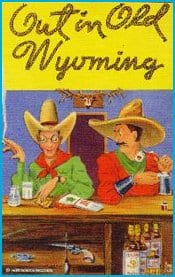Camp and catchiness weren’t the only reasons for naming the Canadian Lesbian and Gay Archives’ (CLGA) first annual fowl supper Oklahomo. While it may be no surprise to showtune-queens that many homo hands were involved in the creation of the beloved 1943 musical Oklahoma it’s less well known that its source material is inextricably entwined with gay cowboy literature.
CLGA volunteer Alan Miller is an expert on the history of gay cowboys. His website, Cowboysong.com, contains many fascinating images and examples of the tradition of manly affection in the Wild West. Miller says that in the days before families, or even many women, colonized the frontier it was up to the aspiring cowboy to find a more experienced partner to travel with upon reaching the frontier.
Miller points to the 1915 Badger Clark poem “The Lost Pardner” as an example: “We loved each other in the way we do and never spoke about it, Al and me/ But we both knowed and know it so true/ Was more than any woman’s kiss could be.”
Cowboy poetry with a homoerotic slant was printed on postcards and published in voluminous collections of which the CLGA has many examples. One of the best-known cowboy poets was Witter Bynner. Known to his bitchy intimates as Bitter Whiner, Bynner was a prominent member of an artists colony centred in Santa Fé, New Mexico. The memoirs of Italian opera star Joseph Benton relate how, in the early ’20s, fellow male student Lynn Riggs was seduced by a young man who “set siege at Lynn’s love-castle and soon won out.” Riggs proceeded to suffer a “nervous breakdown” and set out for Santa Fé for treatment of a “deeply rooted case of pulmonary tuberculosis.” A doctor prescribed manual labour and Riggs soon began work on Bynner’s ranch. Miller flips through a series of biographies from the CLGA collection and produces several photographs of Riggs and Bynner, both posed in a brazenly coy manner and wearing identical belt buckles. Howdy pardner, indeed.
Apparently Bynner’s artistic influence was advantageous. Riggs became a popular playwright, receiving a Guggenheim fellowship. The prize money allowed Riggs to exile himself to Paris where he wrote Green Grow the Lilacs, a “folk-play in six scenes” which became a hit on Broadway in the 1930s. Green Grows the Lilacs became, with refrains from music-meisters Rodgers and Hammerstein replacing the traditional cowboy songs, Oklahoma.
Miller deftly links it all together and the CLGA’s collection provides the proof: one of the highlights of American theatre was inspired by cowboys who, decades before Brokeback Mountain, parked their boots together by the campfire.
While Riggs is still honoured in Oklahoma reports of his homosexuality have been actively suppressed. As recently as 1988 the University of Oklahoma Press was threatened by a relative of Riggs with removal of all Riggs’ papers from its collections if his homosexuality was discussed in a biography. But if there was any doubt about Riggs’ place in homo history one tidbit puts the case to rest: His most beloved pet, a Scottie named Baron, was a gift from Joan Crawford.

 Why you can trust Xtra
Why you can trust Xtra


